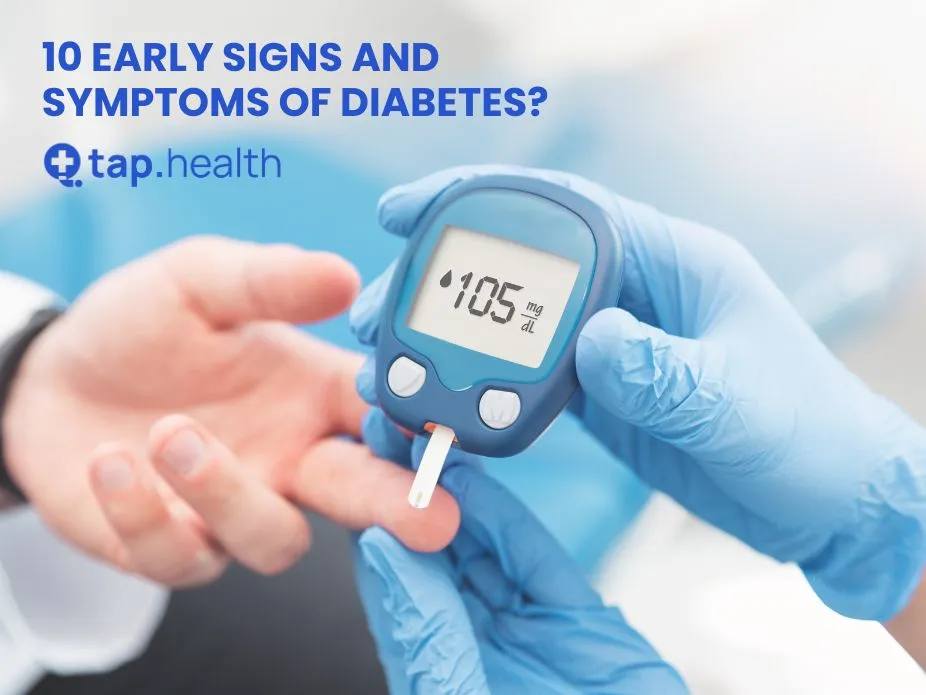Diabetes is a chronic condition that affects how your body turns food into energy. When you have diabetes, your body either doesn’t make enough insulin or can’t use it as well as it should. Insulin is a hormone that helps glucose from food get into your cells to be used for energy. Without enough insulin, too much glucose stays in your blood, which can cause serious health problems over time. Recognizing the early signs and symptoms of diabetes is crucial for getting timely treatment and managing the condition effectively. In this blog post, we will discuss the ten early signs of diabetes, its causes, when to see a doctor, and risk factors associated with the disease.
10 Early Signs and Symptoms of Diabetes
1. Frequent Urination
One of the first signs of diabetes is frequent urination, especially at night. When there is too much glucose in the blood, the kidneys work harder to filter it out, leading to increased urination.
2. Excessive Thirst
Along with frequent urination, excessive thirst is another common symptom. As the body loses more water through urination, it becomes dehydrated, prompting increased thirst.
3. Unexplained Weight Loss
Even though you may be eating normally, unexplained weight loss can occur. This happens because the body starts burning muscle and fat for energy when it can’t get enough glucose from the bloodstream.
4. Extreme Hunger
Despite eating well, you may feel extremely hungry all the time. This is because your body isn’t using the energy from the food you eat efficiently, leading to constant hunger.
5. Fatigue
Feeling very tired is another early sign of diabetes. When your body can’t use glucose properly for energy, it leads to fatigue and weakness.
6. Blurred Vision
High levels of blood glucose can cause the lens of your eye to swell, leading to blurred vision. This can come and go, depending on your glucose levels.
7. Slow-healing sores or Cuts
Diabetes can affect your body’s ability to heal wounds. If you notice that cuts and sores are taking longer to heal than usual, it might be a sign of diabetes.
8. Frequent Infections
People with diabetes are more prone to infections, especially in the gums, skin, and bladder. High blood sugar levels can impair the immune system, making it harder to fight off infections.
9. Tingling or Numbness
Tingling or numbness in the hands and feet, also known as neuropathy, can be an early sign of diabetes. High blood sugar can damage nerves over time, causing these sensations.
10. Darkened Areas of Skin
Some people with diabetes develop patches of darkened skin, usually in the armpits, neck, and groin areas. This condition is known as acanthosis nigricans and can be an early warning sign of diabetes.
What are the Causes of Diabetes?
Diabetes can be caused by various factors, depending on the type of diabetes:
Type 1 Diabetes
Type 1 diabetes is an autoimmune condition where the immune system mistakenly attacks and destroys insulin-producing cells in the pancreas. The exact cause is unknown, but it is believed to involve a combination of genetic and environmental factors.
Type 2 Diabetes
Type 2 diabetes is more common and is primarily caused by lifestyle factors and genetics. The body becomes resistant to insulin, or the pancreas fails to produce enough insulin. Key contributing factors include:
- Obesity: Excess body fat, especially around the abdomen, can increase the risk of insulin resistance.
- Physical Inactivity: A lack of physical activity can contribute to weight gain and insulin resistance.
- Unhealthy Diet: Diets high in sugar, unhealthy fats, and processed foods can increase the risk of type 2 diabetes.
- Genetics: A family history of diabetes increases the risk of developing the condition.
Gestational Diabetes
Gestational diabetes occurs during pregnancy and is caused by hormonal changes that make the body less sensitive to insulin. It can increase the risk of developing type 2 diabetes later in life.
When to See a Doctor
If you notice any of the early signs and symptoms of diabetes mentioned above, it’s important to see a doctor promptly. Early diagnosis and treatment can prevent complications and improve quality of life. You should especially see a doctor if:
- You experience unexplained weight loss.
- You are constantly thirsty and urinating frequently.
- You have blurred vision or slow-healing sores.
- You have a family history of diabetes and are experiencing symptoms.
Regular check-ups are crucial if you have risk factors for diabetes, as early detection can make a significant difference in managing the disease.
Risk Factors of Diabetes
Several risk factors can increase your likelihood of developing diabetes:
Risk Factors for Type 1 Diabetes
- Family History: Having a parent or sibling with type 1 diabetes increases your risk.
- Genetics: Certain genes can increase susceptibility to type 1 diabetes.
- Geography: Type 1 diabetes is more common in certain countries, such as Finland and Sweden.
Risk Factors for Type 2 Diabetes
- Age: The risk of type 2 diabetes increases with age, especially after 45.
- Family History: Having a family member with type 2 diabetes increases your risk.
- Ethnicity: Certain ethnic groups, such as African Americans, Hispanics, Native Americans, and Asians, have a higher risk.
- Obesity: Excess body fat, particularly around the abdomen, is a major risk factor.
- Physical Inactivity: Lack of exercise can increase the risk of type 2 diabetes.
- Unhealthy Diet: Diets high in sugar, unhealthy fats, and processed foods can contribute to the development of type 2 diabetes.
- Gestational Diabetes: A history of gestational diabetes increases the risk of developing type 2 diabetes later in life.
FAQs on 10 Warning Signs of Diabetes
1: Can you have diabetes without knowing it?
A: Yes, many people with diabetes, especially type 2 diabetes, may not have noticeable symptoms and can go undiagnosed for years.
2: Are the symptoms of type 1 and type 2 diabetes different?
A: The symptoms are generally similar, but type 1 diabetes symptoms tend to appear suddenly, while type 2 symptoms develop more gradually.
3: Can diabetes be cured?
A: There is no cure for diabetes, but it can be managed with lifestyle changes, medication, and regular monitoring.
4: Can children develop diabetes?
A: Yes, children can develop both type 1 and type 2 diabetes. Type 1 is more common in children, but type 2 is increasingly being diagnosed in younger people due to rising obesity rates.
5: Is frequent urination always a sign of diabetes?
A: Frequent urination can be caused by other conditions as well, such as urinary tract infections or excessive fluid intake, but it is a common early sign of diabetes.
6: How is diabetes diagnosed?
A: Diabetes is diagnosed through blood tests that measure blood glucose levels, such as the fasting blood glucose test, the A1C test, and the oral glucose tolerance test.
7: Can lifestyle changes prevent diabetes?
A: Lifestyle changes, such as maintaining a healthy weight, eating a balanced diet, and staying physically active, can significantly reduce the risk of developing type 2 diabetes.
8: What complications can arise from untreated diabetes?
A: Untreated diabetes can lead to serious complications, including heart disease, kidney damage, nerve damage, vision problems, and foot infections.
9: Are there any early signs specific to gestational diabetes?
A: Gestational diabetes often has no symptoms, so it is usually diagnosed through screening tests during pregnancy.
10: Can managing stress help with diabetes symptoms?
A: Yes, managing stress through techniques like exercise, meditation, and relaxation can help control blood sugar levels and improve overall diabetes management.



